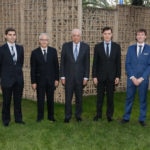Francisco González: “We must endow the most sophisticated machines with ethical judgement”
BBVA Group Executive Chairman Francisco González presided over the first edition of the Spanish Computer Science Society (SCIE) – BBVA Foundation Research Awards. These accolades recognized the work of six young Ph.D. recipients who are conducting high-level research in Spain.

The ceremony, held at the Madrid headquarters of the BBVA Foundation, focused on how computer science has brought about a real change in the technological, economic and social paradigm, and called attention to the challenges that come with it.
“By putting information within everyone’s reach, computer science is proving to be a highly democratizing technology – also due to the lower cost of devices. It is changing corporate organization, consumption patterns, communication, entertainment, knowledge generation, access to healthcare and personal relations,” Francisco González said.
We are about to go beyond what Herbert Simon - one of the fathers of artificial intelligence - predicted decades ago: sharing the planet with computers"
However, “all radical transformations come with challenges,” added BBVA’s Group Executive Chairman. “We are about to go beyond what Herbert Simon - one of the fathers of artificial intelligence - predicted decades ago: sharing the planet with computers. As we approach these levels of intelligent action, we have realized that we must ensure that the most sophisticated machines have ethical judgment.”
Francisco González believes that the risk of greater unemployment is another big challenge: “The solution involves fomenting, enhancing, adapting and maximizing training (…) In order to transform the challenges of this digital revolution into opportunities, we need to offer future generations the knowledge that will allow them to adapt to the new professional profiles.”
“Taking care of and attracting” talent, including women
Both Francisco González and Antonio Bahamonde, Chairman of the Spanish Computer Science Society (SCIE) called attention to the high level of computer science research in Spain and stressed the need to continue attracting talent.
“The six young award winners demonstrate that there is a great deal of computer science research talent in Spain,” Francisco González said. Their work “is essential to our country being a top of the line actor in the current revolution.”
For Bahamonde, “We have tremendous potential in Spain that we cannot afford to squander. Computer science is not done on computers alone, it requires talent. We should empower talent and be capable of attracting it.” He also emphasized the need to “attract women to study the so-called ‘STEMs (Science, Technology, Engineering and Mathematics), particularly computer science. We can’t miss out on the talent of half of the world’s population.”
Six “original, creative and excellent” pieces of research
The Spanish Computer Science Society (SCIE) and BBVA Foundation created these awards to promote and put the spotlight on young computer scientists who conduct high-level research in Spain. The winners of this first edition included research projects to apply artificial intelligence to organ transplants and agricultural sustainability; to generate weather forecasts automatically; to apply big data to the fight against illnesses such as Chagas disease; promote virtual reality and optimize supercomputer performance.
Cristóbal Camarero, of the University of Cantabria, is researching how to improve the interconnections among a supercomputer’s processors, in order to optimize its performance, and for automated demonstrations of theorems and banking applications.
Elena Garcés, of the University of Zaragoza, who is currently a post-doctoral researcher at Technicolor (Rennes, France), has developed algorithms to digitally treat images that are of great interest for films and virtual reality programs.
Josué Feliu Pérez, of the Polytechnic University of Valencia, has improved the efficiency of a type of “multicore” processors, which are present in both smartphones and major calculation centers.
Petar Jovanovic, of the Polytechnic University of Catalonia, has created big data analysis software that the World Health Organization (WHO) is using to eradicate diseases like Changas disease in developing countries.
María Pérez Ortiz, of the University of Cordoba and currently at the University of Cambridge (U.K.), has developed innovative software in areas as diverse as sustainable agriculture, organ transplants, climate change and oncology.
Finally, the work of Alejandro Ramos Soto, of the Universidad of Santiago de Compostela, led to Galiweather - a system that translates technical data from Galicia’s meteorology agency into plain language. It automatically produces 314 weather forecasts per day – one for each of Galicia’s municipalities.